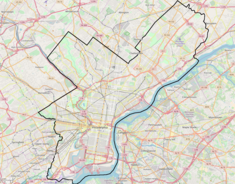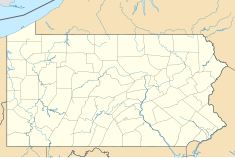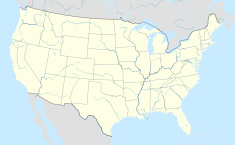Cedar Grove Mansion
Cedar Grove Mansion | |
 | |
| Location | 1 Cedar Grove Drive, Philadelphia, Pennsylvania, 19131, U.S. |
|---|---|
| Coordinates | 39°58′45″N 75°12′16″W / 39.9792°N 75.2044°W |
| Architectural style | Federal |
| Part of | Fairmount Park Historic District |
| NRHP reference No. | 72001151[1][2] |
| Significant dates | |
| Designated NRHP | February 7, 1972 |
| Designated PRHP | June 26, 1956[3] |
Cedar Grove Mansion, located in west Fairmount Park, was the summer residence for five generations of Philadelphia families. The house was built as a rural retreat from city life, and was originally located within the present day Frankford neighborhood of Northeast Philadelphia, about 4 mi (6.4 km) beyond the colonial-era city limits. In 1746, Elizabeth Coates Paschall purchased the property on which the house was subsequently built. Paschall was a widow with three children who had inherited her husband's dry goods business and desired a rural retreat from the city near her father's farm in Frankford. Construction of the grey stone house on a plot of 15 acres (6.1 ha) along Frankford Road began in 1748 and continued to 1750.[2][4]
Additions were made by Paschall and succeeding generations. A granddaughter named Sarah inherited the house, married Isaac Wistar Morris in 1795, and doubled the size of Cedar Grove with more rooms and a third floor. A wraparound porch was added later. Various architectural styles such as Baroque, Rococo, and Federal are evident in the interior rooms.[5][2]
Lydia Thompson Morris, the last of the family to own Cedar Grove, gave the house and original furniture to the city of Philadelphia in 1926. The house was then moved from the Frankford neighborhood to Fairmount Park in 1926–28. The Philadelphia Museum of Art administers the house and has kept it fully furnished with period furniture passed down by generations of the Morris family.[5] Guided tours of the house are available through the Art Museum.[6]
Cedar Grove is registered on the Philadelphia Register of Historic Places[3] and is an inventoried structure within the Fairmount Park Historic District entry on the National Register of Historic Places.[1][2]
See also
[edit] Philadelphia portal
Philadelphia portal- List of houses in Fairmount Park
- National Register of Historic Places listings in West Philadelphia – an inventoried structure within the Fairmount Park listing
References
[edit]- ^ a b "National Register Information System – Fairmount Park (#72001151)". National Register of Historic Places. National Park Service. November 2, 2013. Retrieved November 14, 2017. (archive)
- ^ a b c d "National Register of Historic Places Inventory – Nomination Form". (archive) by George B. Tatum of the Philadelphia Historical Commission. dot7.state.pa.us. National Park Service document via the Commonwealth of Pennsylvania's Cultural Resources Geographic Information System, the Department of Transportation website and the records of the Pennsylvania Historical and Museum Commission. January 11, 1972. Retrieved November 14, 2017.
- ^ a b "Resources Listed on the Philadelphia Register of Historic Places Without Official Addresses" (archive). phila.gov. Philadelphia Historical Commission. April 9, 2012. Retrieved November 14, 2017.
- ^ Wunsch, Aaron (August 1995). "Cedar Grove" (PDF). Historic American Buildings Survey. Washington, D.C.: Library of Congress. Retrieved September 17, 2023.
- ^ a b "Visiting : Plan Your Visit : Historic Houses : Cedar Grove". (archive) philamuseum.org. Philadelphia Museum of Art. Retrieved November 16, 2017.
- ^ "Visiting : Plan Your Visit : Historic Houses : Hours & Admission". (archive) philamuseum.org. Philadelphia Museum of Art. Retrieved November 16, 2017.
External links
[edit] Media related to Cedar Grove Mansion at Wikimedia Commons
Media related to Cedar Grove Mansion at Wikimedia Commons- Philadelphia Museum of Art – Plan Your Visit : Historic Houses – visiting information
- Historic American Buildings Survey (HABS) documentation:
- HABS No. PA-1651, "Cedar Grove", 15 photos, 6 data pages, 3 photo caption pages, supplemental material
- HABS No. PA-6184, "Schuylkill River Villas", 18 data pages of historical context


 French
French Deutsch
Deutsch

